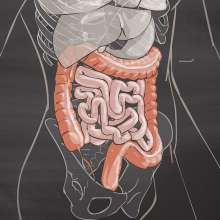Studies show that visceral pain and anxiety, two symptoms of irritable bowel syndrome, can be transferred by transplanting faecal gut microbiota from patients to germ-free mice.
IBS
Irritable bowel syndrome (IBS) is a condition that afflicts 10-20 % of individuals worldwide.
It is characterized by a variety of symptoms including changes in bowel habits, bloating, and abdominal pain. In some individuals diarrhea is a problem, while others experience constipation. In 50-90% of patients, feelings of anxiety or depression are present.
What causes the condition? A number of factors appear to be associated with IBS including the patient’s genetic makeup, diet, immune status and stress level.
Another factor increasingly being investigated is the intestinal microbiota.
Researchers compared the microbiota of IBS patients and healthy individuals. They found that the microbiota of some types of IBS is significantly different from that of healthy persons.
How is this difference related to this disease? Are the changes in the microbiota a result of the condition or does the microbiota play a role in the origin of the disease?
Visceral pain link
An earlier approach to these questions was an experiment that focused on one symptom of IBS, namely the visceral pain.
Researchers introduced microbiota from the feces of IBS patients with moderate severity pain into the gut of germ-free rats to determine whether the transplanted microbiota would produce the visceral pain. Control groups of germ-free rats were colonized with microbiota from healthy individuals.
The species composition of the microbiota from IBS and healthy humans used in the experiment were found to be significantly different.
After 7 weeks, feces from both groups of rats were examined and it was found that their microbiota were very similar in composition to the microbiota of their respective human donors.
Using abdominal contraction as a measure of pain, it was found that rats receiving the IBS patients’ microbiota had a significantly higher pain score than rats receiving healthy donors’ microbiota.
Researchers concluded that the altered microbiota associated with IBS plays a key role in the visceral pain of patients, perhaps via certain metabolites produced by the bacteria.
Anxiety transferred with gut microbes?
A recent, more extensive study extended the investigation into the role of microbiota in anxiety symptom associated with IBS.
Microbiota were isolated from feces of IBS patients with diarrhea (IBS-D). These patients were also assessed for anxiety, with some showing the symptom while others did not.
Bacteria were also isolated from the feces of healthy individuals who had no gastrointestinal or psychiatric symptoms.
The microbiota from these two sources were not greatly different, except in the relative abundance of certain families of bacteria.
Researchers gave microbiota from the IBS-D patients to several groups of germ free mice. Members of each mice group were given microbiota from a single IBS-D patient. Likewise, control groups of germ-free mice were given bacteria from healthy persons.
Three weeks after the introduction of the microbiota, both experimental and control animals were examined for features that are characteristic of human IBS-D.
Compared with control mice, IBS-D mice were shown to have: faster gastrointestinal motility, increased expression of certain genes associated with inflammation, and differences in released amount of certain substances known to affect the nervous and immune systems.
Various tests were also performed to evaluate anxiety in the mice. Mice that received microbiota from IBS-D patients with anxiety showed anxiety behaviour compared to the control mice.
Those mice with microbiota from IBS-D patients without anxiety behaved like the control mice, with no anxiety symptom.
These results indicate that the microbiota play a contributing role in the anxiety feature of IBS-D.
Is the altered microbiota the primary cause of the disease? Researchers are cautious to point out that some changes in gut physiology brought about by stress, for example, may be the underlying basis for the change in the composition of the normal microbiota.
However, it should be kept in mind that these results could be due to some as yet unknown factors in the intestine of IBS-D patients other than microbiota. Those factors might have been transferred along with the microbiota.
One hypothesized potential candidate of such factors is the gut microenvironment, which was somehow transferred with the gut microbes.
Also, the microbiota associated with other forms of the IBS may not play the same role as that of IBS-D.
The results of this study support the use of probiotics and prebiotics to ameliorate IBS symptoms by modifying the gut microbiota.





